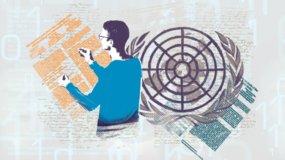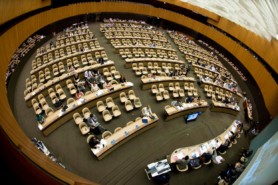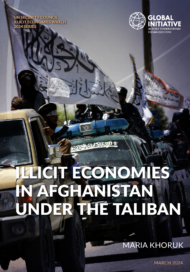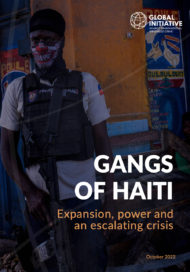Posted on 22 Feb 2021
Validated on 5 February 2021, the new DDR and Organized Crime module – developed by the Global Initiative Against Transnational Organized Crime and the UN Inter-Agency Working Group on DDR – seeks to support the design of more effective and comprehensive DDR processes in conflict settings affected by organized crime.
The challenge posed by organized crime in conflict settings has become increasingly clear in recent years, but efforts to address it have lagged behind. In part, the issue has been definitional: organized crime’s role in conflict is complex, varied and often difficult to parse. Although it has long been known that conflict settings create opportunities for criminal actors, we now understand that crime and conflict can be mutually reinforcing, with the profits from criminal activities providing parties to conflict and individuals with the resources (and sometimes the incentive) to carry on fighting. In some cases, criminality and conflict can become so intertwined that lines distinguishing activities, actors and motives can become blurred, if not obsolete.
Over the past two decades, the United Nations has recognized the need to address the challenge posed by organized crime, illicit flows and markets, and criminal actors in conflict zones. Using the Global Initiative’s interactive online tool, we found that 35% of the 1 113 UN Security Council (UNSC) resolutions passed between 2000 and 2017 mentioned organized crime. This incidence has been higher in the past three years, with 40% of resolutions passed in 2018 demanding a response to organized crime in conflict settings, rising to 50% in 2019; in 2020, the figure was 43.8% of resolutions passed.
In addition to resolutions, the organized crime–conflict nexus must be addressed in the development and implementation of disarmament, demobilization and reintegration (DDR) operations in order for peacebuilding and peacekeeping activities to be effective. Until recently, discussions on organized crime in conflict settings had been largely confined to the realm of reintegration efforts, but it is now recognized that the phenomenon is integral to the entire DDR process, not only to ensure that DDR efforts are successful, but also that their effects are long-lasting and sustainable.
If left unaddressed, criminality can undermine peace efforts and DDR objectives, as has been seen in various cases. For example, conflict continues in the Democratic Republic of Congo (DRC), particularly in the eastern regions of the country, despite years of peacekeeping operations and a high number of combatants participating in formal, internationally supported DDR programmes. These DDR programmes were, however, put into place without taking into account the role of the illegal exploitation of so-called conflict minerals in providing revenue for armed groups. As a result, mining sites were not demilitarized by peacekeeping operations, reducing incentives for combatants to participate in DDR initiatives. Moreover, the rapid integration of former non-state combatants into the DRC’s formal army failed to implement adequate vetting procedures for criminal activities and human rights abuses. Meanwhile, violent competition over the illicit market surrounding natural resources was amplified.
Colombia is another case that illustrates the challenges of DDR programming. Following the end of a decades-long conflict, in which criminal activity became entrenched in violence dynamics in the country, DDR programmes in the country went through numerous changes, continually addressing shortcomings and challenges that were detected along the way. But criticisms arose of non-transparent negotiation agendas, inflated numbers of demobilized combatants, an improvised reintegration programme and an inability to guarantee the safety of ex-combatants who laid down their arms as part of DDR amid ongoing violence perpetrated by neo-paramilitary organizations involved in drug-trafficking. While in many ways Colombia’s DDR programmes were considered successful, as violence decreased in parallel to the DDR process, organized crime continued, and illicit drug production (in the form of coca cultivation) has since risen. The underlying causes of drug production, including the marginalization of coca farmers, was never addressed as part of the programmes.
A new DDR module for organized crime
To improve the UN’s performance in the area of DDR, the UN Inter-Agency Working Group (IAWG) on DDR was tasked with the development and maintenance of a common set of DDR guidance, known as the Integrated Disarmament, Demobilization and Reintegration Standards (IDDRS). These standards, which had been revised between 2009 and 2014, serve as the UN touchstone for comprehensive and detailed policies and guidelines for undertaking DDR.
To continuously reflect the changing global landscape of armed conflict, the IDDRS are currently being revised again- this time to include specifically addressing the challenges posed by organized crime. Recognizing that illicit criminal networks play a role at all stages of conflict, and that the IDDRS did not contain guidance on organized crime, the IAWG called on the GI-TOC to develop a new module on DDR and linkages to organized crime.
Validated on 5 February 2021, the first-ever IDDRS module 6.40 on DDR and Organized Crime serves as a foundation for practitioners to develop and implement tailor-made DDR processes to assist ex-combatants and persons associated with armed forces and groups engaged in organized crime through the promotion of alternative livelihoods and reconciliation, as well as for the strengthening of national and local capacities. The module also highlights DDR-related tools that can complement or, in some cases supplement, these efforts, including in community violence reduction, transitional weapons and ammunition management and mediation. The module provides concrete, gender-sensitive guidance for contexts where armed groups are engaged in organized crime, including in cases where organized crime gives rise to conflict, sustains it and undermines peace negotiations.
The DDR and Organized Crime module will be used for policy and strategy formulation, trainings, integrated planning, programme development, and monitoring and evaluation for DDR practitioners in both mission and non-mission settings, as well as for DDR efforts within and outside the framework of comprehensive peace agreements. The guidance is relevant for all actors engaged in tackling the conflict–crime nexus at local, national and regional levels.
Ultimately, the module represents a significant milestone in DDR policy and practice that will help design more sustainable and effective processes and assist in breaking the pernicious grip of organized crime in conflict.



